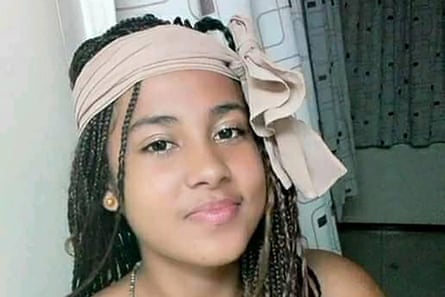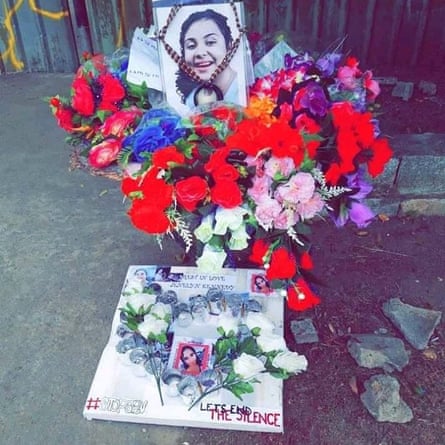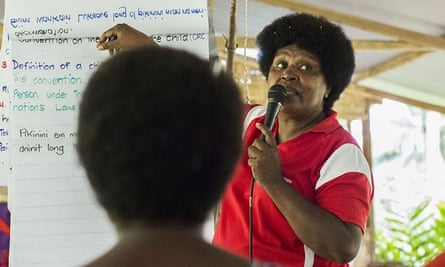For six full days 19-year-old Jenelyn Kennedy suffered. Her legs and arms were chained, witness statements to police say, her mouth gagged.
They allege she died from being beaten, locked in her room. Her young children in a room down the hall.
Her partner and the father of her two children has been charged with one count of wilful murder. His case remains before the courts. He has not entered a plea.
But Jenelyn did not die alone.
Shockingly, according to reports, life appears to have continued around her: people, even health workers, coming and going, fully aware of what was happening.

But out of the senselessness has come a new sense of resolve: while criminal liability for her murder has yet to be proven in court, Jenelyn’s death has sparked a movement.
Ordinary citizens across Papua New Guinea are taking part in the “Shine a Light” movement, rallying to dismantle a system that has allowed gender-based violence to continue, too often with impunity.
We’ve had men standing up, coming forward in unprecedented numbers. An increasing number now understand the consequences gender-based violence has on their families and their children’s future.
Workers have started wearing black to work on Thursdays in memory of Jenelyn and the thousands of other victims of gender-based violence. I had three male staff who came in black last week.
It is estimated that 70% of women in PNG have experienced gender-based violence. A 2019 report, “Unseen and Unsafe” found that 2.8 million children in PNG had experienced violent “discipline” at home.
It is the silence that scares me. We hear a lot about cases that happen in the city, but what about the violence occurring in the small villages? What about the girls in the mountains or on the islands whose abuse is not being reported?

The horrific death of Jenelyn Kennedy has brought many people together, but, as a mother and as a woman in PNG, I’d like to see a sustained campaign involving everybody to stop violence against women in this country.
I believe things can change: there has been progress, particularly in Port Moresby, where NGOs, church and community groups run education programs.
Yet so much more is needed. For systemic change to occur it cannot just happen in the city. Change needs to happen in the provinces and villages too.
A lot of money has been spent to protect the community from Covid-19, now we need the government to do the same for gender-based violence all over the country. We need services for survivors, safe houses, and counselling.
At the same time the perpetrators, most of whom are intimate partners of the women, need counselling too. PNG needs to educate its men on the consequences of violence on their families, especially for women and girls.
If we work with both survivors and perpetrators, we might flatten the curve of this violence that is killing far more Papuan New Guineans than the coronavirus.
Save the Children PNG has a project called “Safe Community, Safe Children” in 30 communities across Bougainville and Morobe Provinces. As part of this work we are starting conversations about child rights and the roles and responsibilities of fathers and mothers. We are working closely with our partners in the community, we are educating counsellors, and village leaders who understand the different types of abuses.

In many of the communities where we work in Morobe Province I have already seen changes in men’s approach to their children and their wives.
Sometimes small acts carry great weight: like the father and husband who cooked – banana and yam in creamed coconut – for his wife, the first time he had prepared a meal for her in more than 20 years of marriage. I’d like to see more of these men preparing food for their wives, helping more with chores and parenting.
Recently, a high-profile assault of a woman by her partner prompted the prime minister, James Marape, to release a statement personally condemning violence against women.
“This is not a Melanesian thing, this is not cultural, don’t use those excuses, this is real character we are talking.
“Brothers and sons, leave that lady alone, exercise restraint, don’t jeopardise your own future, your children’s future and your wife’s health and future.”
It was the first such statement ever from a PNG prime minister and a significant step forward.

But more is needed. The government needs to fund the enforcement of existing laws and policies – such as the 2015 Lukautim Pikinini Act – that are already in place to protect women and children.
Many people are not aware of these laws. Even the police don’t know how to implement many of the laws we already have.
When a child goes to school, they are taught maths, English, science and all these things, but learn nothing about gender-based violence. This also must change.
As Melanesians, we copy what our parents or grandparents do. We need to break the cycle and start educating our children about gender-based violence, women’s rights, and their own rights.
We must do it for the love and memory of Jenelyn and so many other women, and for all our nation’s children.
Emma David is a senior child protection trainer and project coordinator at Save the Children in Papua New Guinea.
